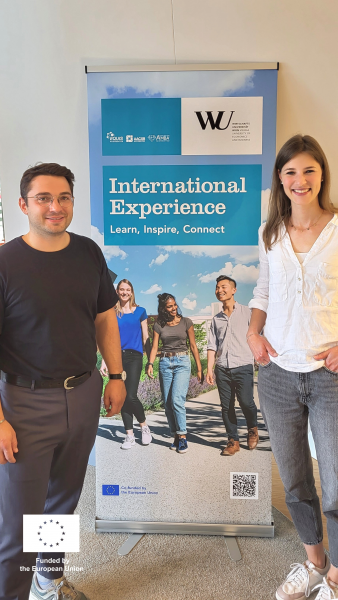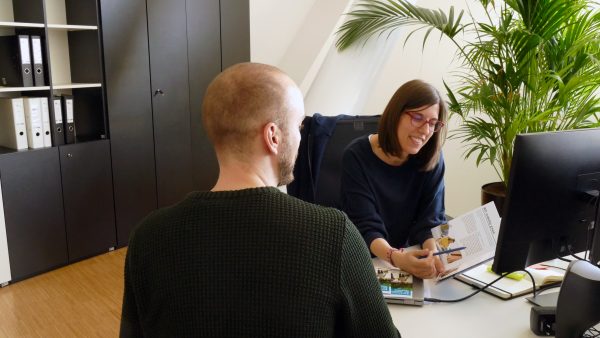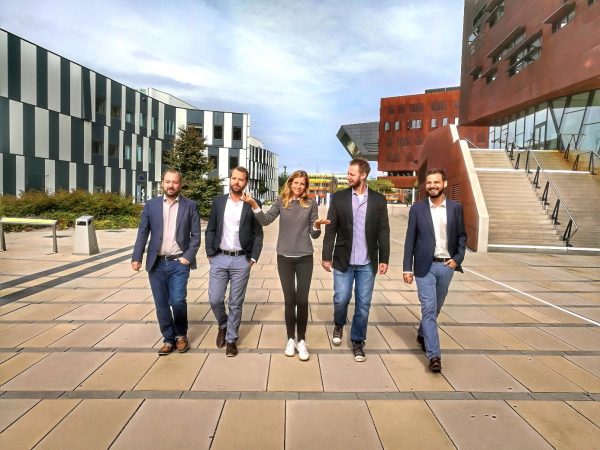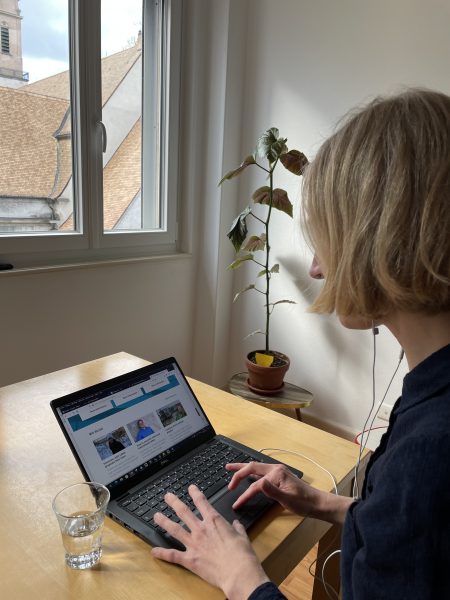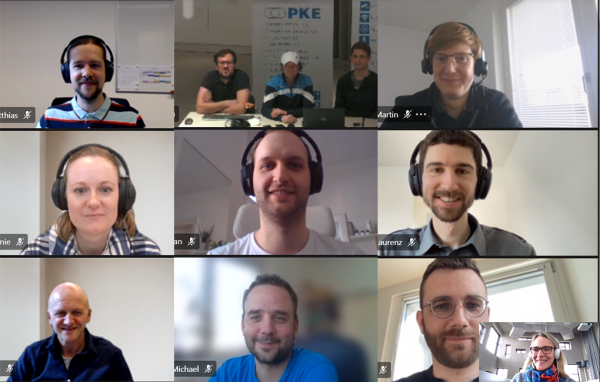Why should YOU go for a PhD?
Are you considering a PhD? After a master’s degree, you may find yourself facing a difficult decision: to leave university for an industry job or to embark on an academic challenge and do a PhD? Starting a PhD could be the best decision you ever make, but it raises a number of questions: Why should you do a PhD? What are the challenges? What would your career look like? We have interviewed an alumna and three PhD candidates from the Vienna Graduate School of Finance (VGSF), located here at WU.

Julia Reynolds graduated in 2017 with a PhD in Finance. She is now working at USI Lugano (Switzerland) as a postdoc.
WU Blog: What were your personal reasons for applying for the VGSF PhD program?
Julia Reynolds: I first started thinking about doing a PhD in finance while working towards my MBA in Vienna. A colleague told me about the Vienna Graduate School of Finance, and so I started attending the VGSF’s Finance Research Seminars – weekly events in which top academics are invited to present current research. I was very impressed by the environment and quality of the seminars, and furthermore got to know some of the faculty and students. I knew quite quickly that the VGSF was my top choice for a PhD program.
I think my favorite thing about the VGSF was probably the interaction with the faculty. I had weekly (if not daily) interactions with VGSF faculty members, and the professors were particularly focused on supporting students in their research. This really set the VGSF apart in my opinion. For example, the VGSF hosted an annual two-day conference at which the entire faculty and student body gathered to hear students present the progress of their research and receive feedback.
WU Blog: How did you cope with the challenge of organizing your work and study routine and your free time?
Julia Reynolds: Choosing to embark on a PhD is not an easy decision. It’s a huge commitment, in terms of both time and mental energy. However, it’s a challenge that is incredibly rewarding when you choose to pursue a research area that really interests you. Between coursework and developing my own research projects, the PhD program often kept me very busy. I therefore found it important to make sure I took time to relax, and fortunately Vienna was a city with much to offer in terms of things to do! From outdoor activities (hiking, swimming, cycling, etc.), to fantastic restaurants, to a wide variety of shows and concerts, Vienna has something to offer for every interest. For example, going for a run often helped me hit the “reset button” when I felt frustrated. The VGSF offices are right next the Prater, one of the largest public parks in Vienna. I can remember many evenings in the office when, after getting stuck on a problem, I would grab my running shoes and hit one of the Prater’s running trails – some of my best ideas came to me during those runs!
I was also fortunate to have a wonderful group of colleagues with which to share the experience along the way as a PhD student. I came to really value my PhD cohort and classmates, not just for their input in coursework and research, but also for their support and socialization. Whether grabbing lunch or coffee, going for a run, or playing a round of Texas Hold ‘Em poker, there was always someone to spend time with when I needed a break. Not to mention the fact that, since we all came from such diverse backgrounds, there was a lot that we could (and did) learn from one another. Even now that I’ve completed my PhD, I still look forward to meeting up with my former VGSF colleagues at conferences and university visits.
WU Blog: What did you expect from your PhD? Were your expectations met?
Julia Reynolds: I began my PhD hoping for a dynamic and diverse group of intellectuals and academics from which to learn and with which to discuss ideas. I also expected to receive a well-rounded education in finance, while at the same diving in-depth into the various subfields, so that I could discover which areas and topics interested me the most. I would definitely say that these expectations were met. The faculty had the expertise and knowledge to help and support me as I began to develop my research questions, but at the same time asked challenging questions and made sure I never lost sight of the broader economic intuition behind my ideas. I gained exposure to a wide variety of different finance areas through courses such as Paper Reading – in which students were asked to read and present current research papers in the field – and various elective courses on specialized topics, often taught by international visiting faculty with expertise in the field.
One thing that I did not necessarily expect from doing a PhD – the more I learned, the more I learned how much I didn’t know! Finance is a wide and diverse field, with many questions left to be answered. There’s both challenges and opportunities in learning how to answer such questions through robust research – and overall, I think I’ve learned to approach research (even my own) with an open mind but also a critical eye.
WU Blog: Would you do it again?
Julia Reynolds: Yes I would! Besides leading me to begin a career in academia, I think that the PhD experience has shaped me into a more curious person and a more critical thinker. Doing a PhD is definitely not something for everyone, but it’s an experience with its own unique challenges and rewards that I would recommend to those with a genuine interest in their field, a tendency to ask too many questions, and a passion to learn more about the world around us.

Nick Dinev is in the last year of his PhD. In January, he has travelled to the USA to attend the AFA job market, an event where all top schools interview candidates for academic positions.
WU Blog: What were your personal reasons for applying for the VGSF PhD program?
Nick Dinev: Before commencing work on my PhD, I was employed as a consultant for the Boston Consulting Group (BCG). At the time, I was looking for a new challenge, but thought it would most likely be a new job rather than a new degree. I was looking for a position where I could add extra intellectual rigor. While work at BCG was intellectually interesting, the realities of the time pressure in consulting mean that oftentimes you have to follow the Pareto principle (also known as the 80/20 rule). In academia, a lot more weight is placed on the depth and originality of the analysis, which I really like.
WU Blog: How do you cope with the challenge of organizing your work and study routine and your free time?
Nick Dinev: Being a graduate student is like being an entrepreneur, like being your own boss. You retain ultimate flexibility and are able to work at your own preferred pace. The doctoral student position allows one to squeeze the most productivity out of oneself by picking the most efficient times for research, teaching, and other activities. Sometimes, this means writing for long hours on end when you are in a state of flow. Other times it means going for a run in the afternoon to punctuate your day when you have hit a roadblock in your research that may seem insurmountable and your brain needs some downtime to work things out.
WU Blog: What do you expect from your PhD?
Nick Dinev: I expect to land an academic position where I can continue to actively engage in both research and teaching. While this is my plan, having a PhD in finance gives one a multitude of other options for ancillary or alternative employment. Academic positions enable one to also participate in consulting projects and thereby stay near to the practitioners whose activities we study. Companies like Cornerstone Research, where some of our best alumni are employed, offer opportunities that combine the intellectual rigor of academia with some of the advantages of non-academic employment.
WU Blog: Would you do it again?
Nick Dinev: Absolutely. 100%. The level of instruction and support at VGSF has been great. Over the years, the faculty has developed a strategy to enable young researchers to get to the intellectual frontier of the discipline. Lectures taught by both core and guest faculty (such as Toni Whited’s Econometrics and Klaus Ritzberger’s Game Theory) are truly world-class.

Patrick Weiss obtained a master’s degree in Quantitative Finance from WU. Before embarking on a challenging adventure and enrolling at VGSF, he acquired work experience in the industry as a consultant.
WU Blog: What were your personal reasons for applying for the VGSF PhD program?
Patrick Weiss: I started thinking about applying for a PhD late. As a matter of fact, I always considered myself a manager of some sort. My professional life started with an interesting position at a consultancy, which I enjoyed very much and which led to ambitious plans for my future career. The turning point was when I started reading scientific articles and attending VGSF’s research seminar, where I learned about current research and met top international researchers. I was immediately attracted by the academic spirit, and doing a PhD was the logical consequence. I could not think of a better place than WU, and this is how I found out about VGSF. What makes VGSF’s offer ideal for me is the mix of local and visiting faculty and the program’s flexibility, support, and intellectual freedom. If I cannot achieve my goals here, I certainly could not have done it elsewhere.
WU Blog: How do you cope with the challenge of organizing your work and study routine and your free time?
Patrick Weiss: Without a doubt, a PhD is not a piece of cake. It demands dedication and long-term commitment. Distractions are plentiful; however, a suitable working environment helps me to focus. My colleagues are excellent motivators and support me during the ups and downs of conducting research. The faculty also plays a key role by providing constant guidance and support. Additionally, my thought processes work best when I am relaxed and in a good mood, which in turn requires breaks. Thus, whenever I take time off, I leave my work at the office. In this way, I’m more productive when I return to my office and get more things done.
WU Blog: What do you expect from your PhD?
Patrick Weiss: A PhD is not something I aspire to simply for the sake of having a title, but because of my goal of becoming a successful researcher. The challenges, issues and successes that I’m experiencing during my PhD are essential for my personal development. These experiences will always be a part of my life and hopefully also of my academic career. Overall, my graduation will conclude an interesting chapter of a never-ending story of learning new and interesting things, i.e. of being a researcher.
WU Blog: Would you do it again?
Patrick Weiss: Yes, absolutely!

Giedre Lenciauskaite is a 4th year student at VGSF. After completing her master’s at Tilburg University, she moved to Vienna to start her PhD in Finance with us.
WU Blog: What were your personal reasons for applying for the VGSF PhD program?
Giedre Lenciauskaite: After my bachelor’s studies, I started working at an insurance company in my home country, Lithuania. Three years later, I decided to do a master’s degree in Finance, so I took a one-year break from work and went to study at Tilburg University in the Netherlands. My original plan was to get a master’s degree and go back to work. I did what I had planned – but soon enough I found myself browsing the websites of universities offering PhD programs in Finance and asking myself whether this could be something for me. Despite enjoying my job, I was always fascinated by the academic lifestyle. I liked the idea of researching questions that interested, attending conferences and being surrounded by intellectual and stimulating people. This is how I imagined life in academia back then, and I can now say that it seems to be very close to the reality. Of course, not all aspects of academic life are positive. The high uncertainty at the beginning of an academic career was one of the main drawbacks for me. Nevertheless, after weighing all the pros and cons, I decided to apply for PhD programs.
I selected the PhD program I would apply for based on several criteria. First, I wanted it to be located in Europe. Second, I wanted it to be well structured, yet flexible enough. Initially I did not know what my research interests could be. I wanted to have the freedom to explore different areas to be able to find out what interests me and, if needed, be supervised by different professors. I saw a clear structure and a defined duration of the program as a big advantage in planning my time and career. Finally, I was looking for a program that would provide enough continuous financial support so that I would be able to concentrate exclusively on my research. The program offered by WU through VGSF satisfied all these criteria. Once I got my acceptance letter, I could not have been any happier.
WU Blog: How do you cope with the challenge of organizing your work and study routine and your free time?
Giedre Lenciauskaite: Organizing one’s work and study routine and free time while doing a PhD might well be tougher than it sounds. The truth is that PhD studies are not an easy ride, and there is always one more paper to read or some more calculations to make. Finding a way to maintain a good work-life balance is therefore not an easy task, but it is very important for keeping a healthy state of mind. I cannot share a universal recipe how to do this, but I can name some things that help me. First, from time to time I try to see the bigger picture. Clearly, my studies are very important and require a lot of time and energy; however, they are only a part of my life. Picturing myself in the future not only as a researcher but firstly as a person helps me to prioritize my activities and focus on what is most important. Second, good time management and self-discipline are crucial. I prefer having a defined working routine. Of course, I have some level of flexibility, but knowing my working schedule helps me to concentrate and manage my time better. Finally, having interests outside the school helps a lot. I like doing sports, travelling, attending cultural events like theater, art galleries …Vienna has a lot to offer.
WU Blog: What do you expect from your PhD?
Giedre Lenciauskaite: I believe that having a PhD degree would open up more doors for me and expose me to more unique working opportunities. Ultimately, a PhD degree does not mean that you cannot get a job which does not require it. However, it gives you access to a pool of interesting and rewarding jobs for which a PhD is a must, for example becoming a professor at a university.
Wu Blog: Would you do it again?
Giedre Lenciauskaite: I would consider it carefully, but I would do it again.
Are you interested in a PhD program at WU Vienna?
Wu Vienna offers three different PhD programs. If you’re interested in one of them, don’t miss the Orientation Session on 22 February, 2018 (5 p.m.)!
PhD Finance: VGSF offers a PhD program in Finance as part of a collaboration between WU Vienna, the Institute for Advanced Studies (IHS), and the University of Vienna. The VGSF offers up to four fully funded positions for its program, but you have to be quick! The application period closes on January 31, 2018 at 2pm.
PhD International Business Taxation: The Doctoral Program in International Business Taxation (DIBT) offers an excellent doctoral education to outstanding students from all over the world, fully preparing them to conduct research on international business taxation.
PhD Economics and Social Sciences: The PhD in Economics and Social Sciences is a three year-program with 26 weekly hours of courses.
#PhD #PhdProgram #Finance #EconomicsAndSocialSciences #InternationalBusinessTaxation #VSGF














